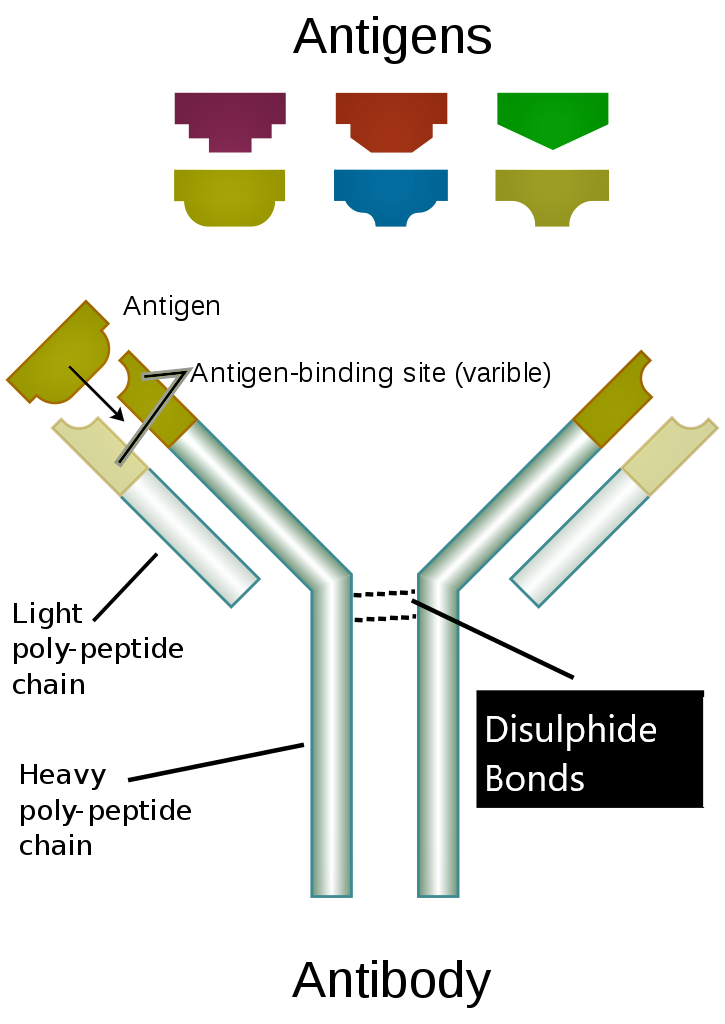
What is epitope and paratope?
Answer
601.2k+ views
Hint: Epitope and paratope take part in the antigen-antibody reaction and complex formation. These are small segments present on certain molecules which are mostly proteinaceous. One of them is produced by B-lymphocytes.
Complete answer
The epitope is a specific region that consists of a sequence of amino acids and is present on the antigen. This specific region is recognized by the antibodies present in our circulatory system, after which they bind to the antigen, which results in their inactivation. The region present on antibodies which binds to the epitope region present on the antigen is known as the paratope.
Additional Information:
Structure of Antibody -
-Antibody consists of four peptide chains, two small chains known as light chains or L- chains, and two large chains known as heavy chains or H-Chains. It is Y shaped in structure. They are represented by the formula H2L2. Antibodies can be either present on the cell membrane surface or remain freely suspended in blood plasma.
-There are five major types of antibodies that are produced in our body. They are known as immunoglobulins, namely IgG, IgA, IgM, IgD, and IgE. Almost 80% of the antibody fraction consists of IgG.
-Lymphocytes are responsible for the primary and secondary immune responses and the antibodies are produced by lymphocytes. Two types of lymphocytes are mainly present, B lymphocytes, and T lymphocytes. Out of these two B lymphocytes are responsible for the production of antibodies and T lymphocytes help in amplifying the production of antibodies.
Note:
>Different antibodies perform different functions in our body:

Complete answer
The epitope is a specific region that consists of a sequence of amino acids and is present on the antigen. This specific region is recognized by the antibodies present in our circulatory system, after which they bind to the antigen, which results in their inactivation. The region present on antibodies which binds to the epitope region present on the antigen is known as the paratope.
Additional Information:
Structure of Antibody -
-Antibody consists of four peptide chains, two small chains known as light chains or L- chains, and two large chains known as heavy chains or H-Chains. It is Y shaped in structure. They are represented by the formula H2L2. Antibodies can be either present on the cell membrane surface or remain freely suspended in blood plasma.
-There are five major types of antibodies that are produced in our body. They are known as immunoglobulins, namely IgG, IgA, IgM, IgD, and IgE. Almost 80% of the antibody fraction consists of IgG.
-Lymphocytes are responsible for the primary and secondary immune responses and the antibodies are produced by lymphocytes. Two types of lymphocytes are mainly present, B lymphocytes, and T lymphocytes. Out of these two B lymphocytes are responsible for the production of antibodies and T lymphocytes help in amplifying the production of antibodies.
Note:
>Different antibodies perform different functions in our body:
-IgG: Protection against pathogens like bacteria and viruses by improving phagocytosis.
-IgA: Helps in the protection of mucous membranes against viral and bacterial pathogens.
-IgM: It is a part of the complement system and causes agglutination and lysis of microbial cells.
-IgD: Helps in the activation of B-lymphocytes.
-IgE: Involved in allergic and hypersensitivity reactions.

Recently Updated Pages
Master Class 9 General Knowledge: Engaging Questions & Answers for Success

Master Class 9 Social Science: Engaging Questions & Answers for Success

Master Class 9 English: Engaging Questions & Answers for Success

Master Class 9 Maths: Engaging Questions & Answers for Success

Master Class 9 Science: Engaging Questions & Answers for Success

Class 9 Question and Answer - Your Ultimate Solutions Guide

Trending doubts
Which are the Top 10 Largest Countries of the World?

What is BLO What is the full form of BLO class 8 social science CBSE

The value of 6 more than 7 is A 1 B 1 C 13 D 13 class 7 maths CBSE

One Metric ton is equal to kg A 10000 B 1000 C 100 class 11 physics CBSE

There are 720 permutations of the digits 1 2 3 4 5 class 11 maths CBSE

What is the median of the first 10 natural numbers class 10 maths CBSE




